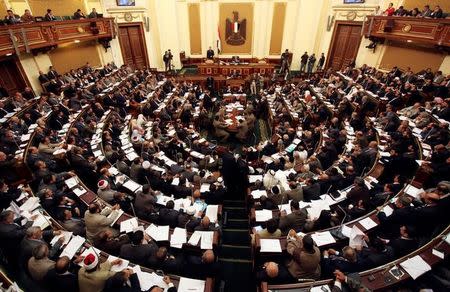Egypt taps new supply and agriculture ministers in reshuffle

CAIRO (Reuters) - Egypt's parliament on Tuesday approved a cabinet reshuffle that included new ministers of supply and agriculture, posts dogged by controversy last year over erratic commodities policy that at times shook the global grain markets. Egypt, the world's biggest importer of wheat, baffled grain markets last year when it intermittently banned the common grains fungus ergot from wheat shipments, the result of a feud between the two ministries over import standards. The outgoing agriculture minister, Essam Fayed, at times supported the zero tolerance policy despite the objections of the supply ministry, which supported a more common international standard. Fayed's successor, Abdel Moneim Al-Banna, currently serves as the head of the Agricultural Research Center, an institution that falls within the agriculture ministry. Banna takes over as Egypt this month begins implementing a new system for inspecting its agricultural imports introduced to streamline the process and ease the fear of traders that had grown weary of supplying to Egypt following the ergot crisis. Ali Moselhy, a lawmaker and former minister of social solidarity under ousted President Hosni Mubarak, will head the supply ministry, replacing Major General Mohamed Ali El-Sheikh. Sheikh's time as supply minister saw a severe sugar shortage that created public uproar and prompted the government to seize private stocks amid accusations of hoarding. As supply minister, Moselhy will chair the highly influential General Authority for Supply Commodities (GASC), which runs the state's grain tenders and can impact world prices by way of its massive purchases. The reshuffle also merged the investment ministry with the ministry of international cooperation. The current international cooperation minister, Sahar Nasr, was tapped to head the joint ministry. The reshuffle also included the ministers of parliamentary affairs, local development, higher education, education, transportation, and planning. (Reporting by Ali Abdelaty; Writing by Eric Knecht and Amina Ismail; Editing by Alison Williams)

